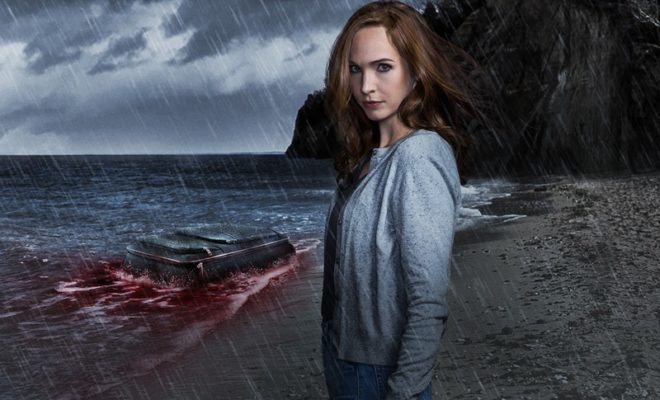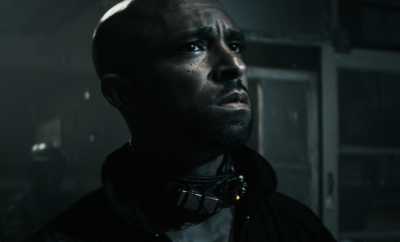
Interviews
Suitcase Killer: The Melanie McGuire Story
By: Jamie Steinberg
Q) Kim, I know you’ve been producing for a while. When you get a project like this do you automatically look for a role for yourself in it, or do you not look for a role in it, or I’m not sure which way that question really cuts, but obviously we know your acting credentials, so it strikes me that perhaps you might have pursued the role of the prosecutor had you wanted it. Can you talk about that a little bit?
KIM RAVER: Sure. Hi, Jay. Thank you for your question. I actually don’t look for a role for myself. I, you know, I love the fact that I can kind of be a creative and my job is on “Grey’s” acting in it. So it’s, I think, you know, my partner, Manuel Boyer, who’s also executive producer on this, we look for things that are story driven and, for sure, I’m looking for really interesting characters. But the way that I can kind of produce is, in a way, if I’m not acting in it. But I still I think my acting drive helps me kind of search out for really interesting characters and really interesting female characters. So, I think my first thing is, yes, I would imagine how an actor would want to play it or perceive it, because if it’s something that I find interesting I’m hoping that other actors as talented as this group, you know, is as interested. So, I think for me it’s character driven, but it’s more about me not acting in it so that I can kind of do it simultaneously.
Q) Candice, I’m just curious. Your career has been filled with fantasy roles and that strangeness that comes in those kind of characters, but when you do a project like this do you sometimes think that life is stranger than fiction, than the fictional fantasy worlds?
CANDICE KING: Yes, absolutely. Even in some of the circumstances we found ourselves filming in. I mean, essentially, recreating what is, of course, in real life, a horrific scene of a body being cut up in a bathtub. I oddly felt right at home with a bunch of fake blood and, you know, being thrown at my face and, you know, fake saw sounds. It really brought me back to some “Vampire Diaries” days, so absolutely real life and fantasy can obvious –There’s a lot of parallels, shockingly.
Q) To follow up, Candice, real quickly, what do you do as far as thinking their state-of-mind? Do you think this person I’m playing is a guilty person or somebody that doesn’t understand guilt? What kind of state-of-mind do you get yourself into?
CANDICE KING: Ooh, well, that’s a big question for anyone that was on set with me, because I get very into stories, and especially true life crime stories. So I talked everybody’s ear off about this case. For me, personally, I really just felt that it was my responsibility to tell Melanie’s story, as those were the shoes that I was filling, and this was someone who, by her own account, she is a mother who was scared and as in an abusive relationship, and who was also very dedicated to her job and who was not perfect. She had many, many faults, self-admittedly. So I really felt that kind –listening to her testimony and that she had given to her lawyers, and as well as there’s a great podcast called “Direct Appeal” in which she spoke for hours, there’s hours of recording of her sharing her story and her experiences that I listened to. So that’s more kind of the direction in which –or at least that’s what I was showing up to set with, you know, also while following the script that we have.
Q) Nicole, you’re a first-time director. What was your experience like bringing this shocking story to television?
NICOLE THOMPSON: It was a great experience being able to work with this very talented cast and crew. As a first-time feature director, it was very important to me to make sure that I did the research to give the story justice and make sure that the facts shine through and showing the characters in fullness, right. Candice spoke to how being flawed, but also having a humanity side to it, so just wanting to make sure that the characters were portrayed properly, but also making sure that film had a full story arc all from beginning to end.
Q) Nicole, interestingly enough, at the last session, we had a Black actress told a story about how she knew she wasn’t getting the role, because the real life person was Caucasian, and she got the role anyway, and so I was wondering, I wanted to ask you are we closer to having real colorblind casting now? Have you sensed any of that at all? And also are we closer to getting rid of that huge gap of there weren’t enough Black people behind the screen, scenes as directors and producers and so on?
NICOLE THOMPSON: Great question. I think Hollywood has definitely began progressing, but I think we still have more to go. I think in terms of your first question with colorblind casting, when I’m looking for cast I’m looking for the best person who can play the role, so I can’t speak for every director or every company, but –and that’s something that’s a priority for me. And I’m happy with the way things are progressing as well as, you know, seeing more people of color in leadership roles behind the camera, so but I would say, back to my first point, we definitely are taking steps further but there’s still more to go, and I’m very thankful to Lifetime who allowed this opportunity, the Broader Focus Initiative is to put more women in opportunities of leadership roles behind the camera, so that’s why I think because of leaders like Lifetime there is a change.
KIM RAVER: Yeah, I’m going to add into that. I really do feel that Lifetime is like what Nicole was saying. They really are taking the steps to give opportunities to women and to women of color, and in order to make those changes we need to have those positions filled by women and Women of Color, and Lifetime is really doing that, and I think as producers, too, we’re really trying to support that, and we have Lifetime’s support, which is it’s really encouraging, and it’s just the steps and moving in the right direction of where we need to go and then, you know, we’re lucky to have the talent of Nicole to be able to direct a movie like this, and Lifetime giving those opportunities. So, yeah, it’s nice that that’s happening, and it’s happening at Lifetime.
Q) Michael, you play Melanie’s husband in the film, who she subsequently murders. What was the biggest challenge you faced in playing him?
MICHAEL ROARK: Well, initially, you know, obviously, whenever we’re doing a story that’s, you know, we’re doing a real-life story here we’re going where are the resources, what are the facts, and the biggest challenge I faced initially was two things. One was while there was a whole lot of information on Melanie there really wasn’t a whole lot on Bill. I was actually surprised how little could be found on Bill. So, you know, I had to do my work, kind of fill in a lot of those gaps and find my own interpretation. And the other is just the speed at which we move. You know, especially when we’re doing film you never know how much time you have to prepare something, so we moved very quickly on this, so that was a challenge but that’s not atypical for making films.
Q) Candice, this is such a dark How long did you shake off a long day of embodying this character?
CANDICE KING: You know, I’d like to say that really going into –tequila. That’s the straight answer. No. I mean, the reality is that we, you know, as to what Michael was just saying, we shot so much in such a short amount of time, which I mean we were –we all were together for many, many hours within this three-week period, so there wasn’t a lot of time to really shake off the character, which I actually appreciated because, which sounds so silly, I usually don’t say things like that, but I really did get so deeply involved with reading as much as I could about this case and Melanie, because it is such a wild and tragic and fascinating story of so many flawed individuals, and even just the prosecution and the defense attorneys, that could be a whole other film in itself, just those two characters and real-life people. So there wasn’t a lot of shaking everything off, but I was totally happy with that, because I really could not get enough of the story and really convincing myself that I was going to solve it. I was just going to solve every, you know, unanswerable question to this case by obsessing over it for these few weeks.
Q) Melanie did gruesome things in order to have the life she wanted. How do you guys feel about her maintaining her innocence even though the evidence proved otherwise? Do you think she was in denial or simply disassociated herself from the crime itself?
MICHAEL ROARK: Ooh, that’s juicy.
CANDICE KING: Well, there’s a lot of circumstantial evidence against Melanie, but that’s what I think is so fascinating about this case is that the actual physical evidence specifically to the condo in which her and Bill lived in they couldn’t find anything within that condo, and that’s what I think –Regardless of what you believe on either side of the case, you have to take that into consideration is, you know, they went four or five times. They took piping from the sinks and to test it and found nothing. So regardless of which side you stand on just, you know, the evidence alone it’s just really interesting based off of what the prosecution came to the courts with.
MICHAEL ROARK: I’ll chime in here. This is something we talked about endlessly on set as well. I do agree. There is, you know, if you look at the facts of the case there’s so many other things other than just, you know, the facts that were presented that even the discovery in the trial seemed like it was a bit off, so we’re not even sure thefacts that were presented, you know, are all the information that’s there. And now there’s no smoking gun evidence but, at the same time, Melanie had some really behavior that kind of looks like someone who would be guilty. So, I mean, and this is obviously very much just like the minimal amount that we can, you know, just say like, you know –The case goes on and on but, for me, like how did it affect me coming in, it didn’t. I mean, I played Bill the way I would play Bill, and do I think there’s more to it? Do I think she was guilty? I don’t know. I’ve got opinions on it, but I’d like to hear what everyone else has to say.
JACKSON HURST: I was kind of torn. I went in thinking she was guilty, guilty, guilty as charged, and then I started listening to the podcast, of course, and I started doing my own research, and then I realized through, yeah, the forensic evidence that was completely lacking. It was circumstantial evidence and it’s crazy. I mean, you could get into the specifics of a few things but I, to this day, am still pretty torn. But, I mean, that’s what makes it such a riveting story, and Lifetime did a good job, Nicole did a good job at not forcing you to choose sides within the movie but just telling the story and then from there the audience can pick a side however they see fit, and then somebody can break Melanie out of jail and everything –everybody would be happy, boom.
KIM RAVER: I think that’s what’s so great about this film. I mean, the talent in it that tells the story, and the directing of it, that it’s this incredible roller coaster of back and forth, and there’s just there’s moments where you’re like, “Oh, my God. She did it.” “Oh, my God. She didn’t do it.” You know, and I think that that –I mean, unfortunately, it’s a real story, but I think that’s what makes a true crime story to watch so appealing is that there is so much back and forth, and it is such a sort of a ride that you go from one side to the other and just makes it a really great true crime story.
NICOLE THOMPSON: Yes, and I would add throughout the entire time it was pretty hard not to be torn, because it’s seeing both accounts, but also our goal was to kind of keep it in a way that the audience can, in return, make their decision.
Q) Candice, did you have to put your mindset in the fact that she was innocent to get an accurate portrayal of her, because I would imagine if you thought she was guilty, I’m not going to ask you to pick sides here, but I’m just wondering did you go into this thinking, yeah, she has to be innocent for me to accurately portray her?
CANDICE KING: Yeah, I mean, I think what any actor usually says to a question like this is that you have to go in servicing the character. So, of course, even though the character is a real person, you know, I am going in telling her story. Now what everyone’s just also shared is there are two different narratives. You know, there’s her story and there is, you know, the reason why she’s in jail, the fact that others believed the prosecution’s story and what they said happened. So, of course, yes, I showed up playing Melanie McGuire as Melanie McGuire and what she shared was her, you know, she still to this day declares innocence, you know, and she passed a polygraph test. It’s not admissible in court, but it’s there. So that’s absolutely the role that I came to. That’s who I was, whose story I was there sharing also while acting out the script and the story that you guys will all see, because it is, of course, we are sharing an entertainment version of these events. So as everyone has said you’re going to have moments of like did she, did she not, and that’s why we’re all turning on the TV to watch something.
KIM RAVER: And I think what Candice does so well in this movie, which is so difficult, is it’s not like a one-dimensional “is she guilty/is she not guilty.” She’s such a human being with so many different layers, and that’s really her specific performance in all of these incredible moments and multilayered moments that it just also makes it –It’s so appealing to watch, because you’re watching this real human being go through and navigate such kind of intricate details of her life, and I think that that’s also what’s so fascinating, and it’s performed so well by you, Candice, and really kind of brings us into her world of how someone gets there whether they’re guilty or not guilty, and so that’s also the beauty of the performance.
Q) Jackson, what is tough about playing a bad guy of sorts as the doctor who’s having an affair with Melanie McGuire?
JACKSON HURST: You know what, it’s you don’t look at yourself as a bad guy. In my case, I looked at myself as an endocrinologist who’s in love with a woman, and that’s essentially it, and everything revolves around love and then at the end of the day did she kill somebody and stuff him in a suitcase, maybe. Do I still love her? Yeah, you know, and at the end of the day, it’s we go to court. I’m sure you guys have all seen the story, but it’s tough to justify all of your actions, but in this case, I loved her, and that’s pretty much it.
Q) Can you all talk about any behind-the-scenes moment that was interesting that we wouldn’t have known about since we were not there on set with you?
CANDICE KING: I mean, I think that what was really interesting was how many times we’d find ourselves filming a scene and, all of a sudden, everyone would just stop for a minute and ran — ike different people in the crew would go, “I don’t know if she did it. I don’t know if she did –“ because we, and then we’d find ourselves in another scene where they’d go, “No, no, no, no, no, this seems like she did it,” and just it was interesting to be acting out these two different, very different accounts that were presented in court, and I think the two ones –which, Nicole, you can expand on –but the two ones that stick out to me were, one, how much fake blood was in that bathroom and even if you were to drain a body of blood there would still be –You know, if you’ve ever been in a surgical room, my dad’s a doctor, so I’ve been lucky enough to witness a surgery, and it’s messy. You know, it’s not –it’s clean but it’s still very hard to keep it perfectly clean, but they’re going to have blood on the walls, and then the second thing would be throwing suitcases over the bridge, because we actually did that, and they were very difficult, and less than what Melanie would have been pushing over the bridge.
NICOLE THOMPSON: Yes, I can’t chime in with that. Uh, Candice did an amazing job at just demonstrating lifting those suitcases and how much they would have actually weighed in real life, and like it’s like this is actually really difficult to do so just experiencing that, to have it come to life, it was definitely a testament to, you know, what some might say how could this happen or how could it not happen, but I would just say that whether you agree or disagree those moments were definitely some things that we can keep with us as we think about the journey of making this film.
Q) I wanted to ask you, Candice, the year on “Vampire Diaries,” what do you think you learned from that experience that you could apply to this one?
CANDICE KING: I mean, I think what I would apply –We had very long hours. We had a lot of nights on that show. We were 22 to 24 episodes a season, so I think making a lot happen in a short amount of time but, obviously, my time on “Vampire” was very special. You know, it immediately kind of bonds you when you are working those kind of hours together. So I think that that’s also something that could be applied to this experience. We’re all coming in. We were all –You know, the story really did take a hold of all of us at different points throughout the experience. It’s impossible for it not to, and so just to immediately all be showing up to make the best story that we could together is something that I was delighted to be able to experience with a new group of individuals in such a short amount of time.
*CONFERENCE CALL*





You must be logged in to post a comment Login